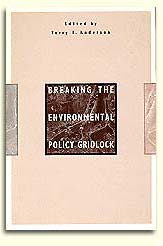Terry L. Anderson, Editor
Although the U.S. Congress has made progress toward fundamental change in economic and social programs,
it remains gridlocked when it comes to creating needed environmental policy reform. This book shows how
policymakers and opinion leaders can break the gridlock and offers specific policy recommendations that
will be palatable to voters across the political spectrum.
The contributions to this volume demonstrate how the principles of fiscal responsibility and individual
accountability that have been applied to economic and social policies–essentially free market
principles–can be applied successfully to environmental policy. The authors offer common-sense reforms
as a starting point, all based on the compelling arguments that a new system of positive incentives can
get us more environmental quality at lower cost.
Breaking the Environmental Policy Gridlock shows how it is possible, today, to muster a coalition for
new environmental policy.
Hoover Institution Press
Stanford University
Stanford CA 94305
800-935-2882
1997; 182 pp.




